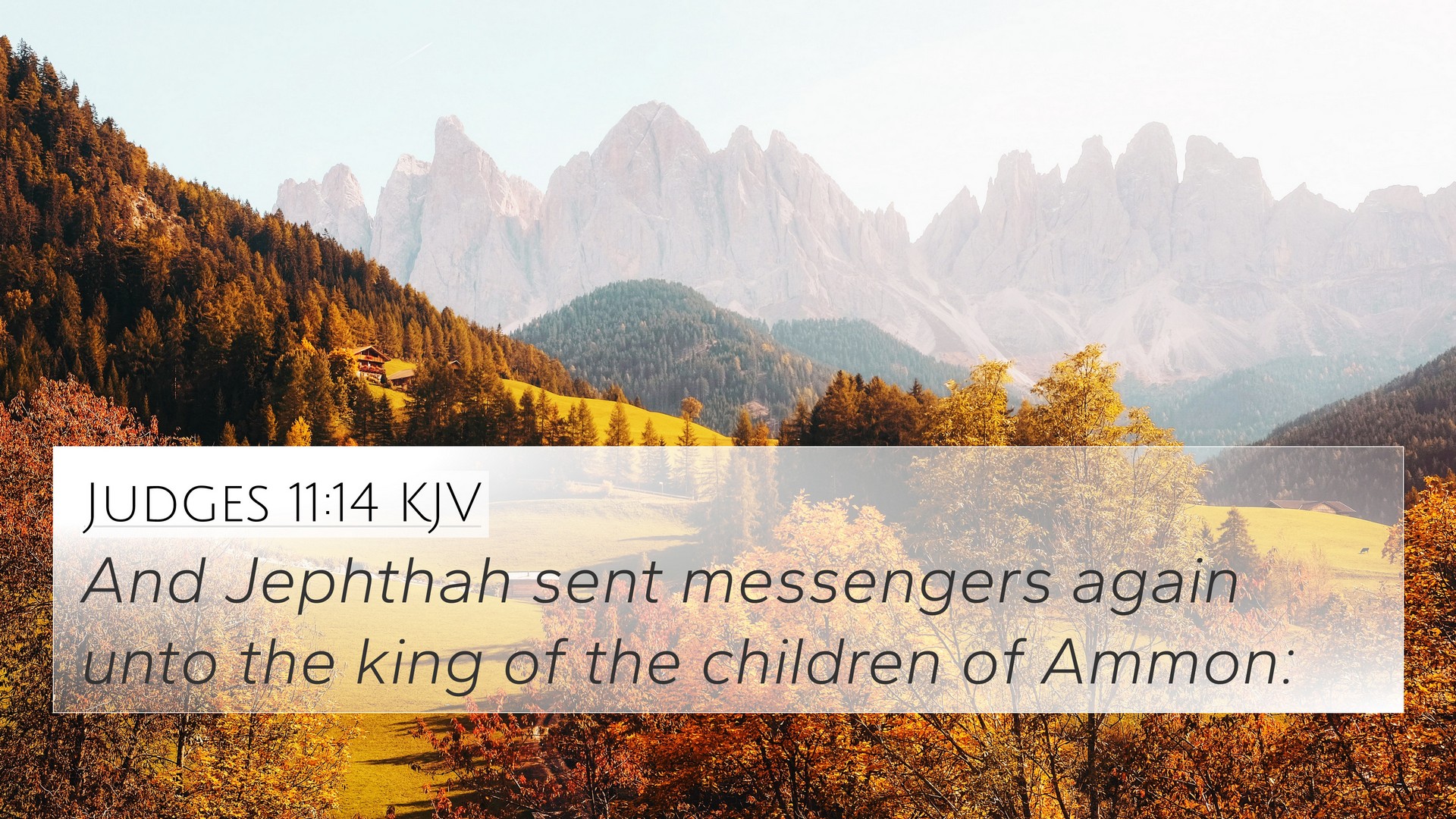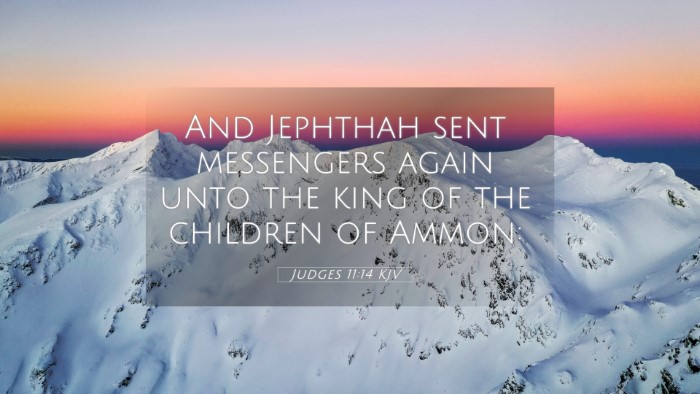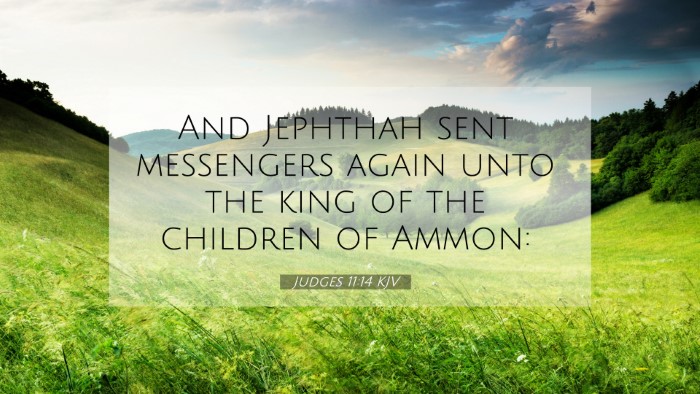Judges 11:14 - Commentary and Interpretation
Judges 11:14 reads: "Then Jephthah sent messengers again unto the king of the children of Ammon." This verse marks a significant moment in the story of Jephthah, a judge of Israel appointed to lead the people against the Ammonite threat. This commentary will explore the complexities of this verse and its connections to the broader biblical narrative.
Meaning of Judges 11:14
The verse indicates Jephthah's proactive approach to conflict resolution. By sending messengers to the Ammonite king, Jephthah seeks a peaceful discourse before engaging in potential battle. This reflects his diplomatic skills and an understanding of the gravity of warfare.
Insights from Public Domain Commentaries
-
Matthew Henry:
Matthew Henry emphasizes the importance of communication in resolving disputes. He notes that Jephthah’s messengers reflect a willingness to negotiate and seek an explanation for the Ammonite grievances. This aligns with the biblical principle of seeking peace before war.
-
Albert Barnes:
Barnes highlights that Jephthah is portrayed as a strategic leader who understands that diplomacy may be a better approach than immediate hostility. Barnes also mentions the historical context of the Ammonite claims over Israelite territories.
-
Adam Clarke:
Clarke points out that Jephthah’s actions are reminiscent of other biblical figures who sought clarity before engaging in battle. He also discusses the implications of Jephthah’s lineage and previous rejection from his family, adding depth to his character and leadership style.
Cross References
Judges 11:14 connects with several other verses in the Bible that emphasize themes of conflict resolution, leadership, and divine guidance. Here are some significant cross-references:
- Proverbs 15:1: "A soft answer turneth away wrath: but grievous words stir up anger." This verse highlights the importance of communication in conflict situations.
- James 1:19: "Wherefore, my beloved brethren, let every man be swift to hear, slow to speak, slow to wrath." This aligns with Jephthah's diplomatic approach.
- 2 Samuel 10:2-4: This passage discusses David sending messengers to Hanun, which parallels Jephthah's actions.
- Matthew 5:9: "Blessed are the peacemakers: for they shall be called the children of God." Jephthah’s initiative can be seen as a step toward making peace.
- Romans 12:18: "If it be possible, as much as lieth in you, live peaceably with all men." Jephthah exemplifies this principle through his actions.
- Proverbs 20:18: "Every purpose is established by counsel: and with good advice make war." Shows the importance of strategy before conflict.
- Luke 14:31: Jesus speaks about the wisdom of considering one's resources before engaging in battle, echoing Jephthah's forethought.
- Judges 11:7: Earlier in the chapter, Jephthah recalls his unjust treatment, which contextualizes the need for negotiation with the Ammonites.
- Deuteronomy 20:10: Instructions for how to engage in warfare with neighboring nations reflect the need for careful deliberation.
- 1 Chronicles 12:32: The men of Issachar understood their times, which illustrates the wisdom in Jephthah's diplomatic efforts.
Thematic Connections
Judges 11:14 can be analyzed through several theological and thematic lenses that illuminate its meaning:
-
Leadership and Responsibility:
Leaders in the Bible often demonstrate qualities of prudence before warfare.
-
Peace vs. Conflict:
The struggle between seeking peace and preparing for war is a recurring theme in scripture.
-
Divine Guidance:
Jephthah’s journey illustrates reliance on God for wisdom in decision-making.
-
Community Relations:
The necessity of maintaining good relations with neighboring nations reflects biblical social ethics.
-
Historical Context:
Understanding the historical backdrop of Israel and the Ammonites enriches the interpretation of Jephthah’s context.
Application for Today
This verse serves as a reminder of the importance of diplomacy and communication in various conflicts we face today, whether personal disputes or larger societal issues. It encourages individuals and leaders alike to seek understanding and strive for peace before resorting to contention.
Further Study and Tools
Engaging in Bible cross-reference study methods can provide deeper insights into the connections between various scriptures. Tools such as a Bible concordance or a cross-reference Bible study guide can enhance one's understanding of Bible verses that relate to each other.
By exploring these thematic Bible verse connections, believers can better understand the overarching narrative of scripture and its applications in their lives. Using these Bible reference resources, such as comprehensive cross-reference materials, can greatly enrich one's study.
Conclusion
Judges 11:14 invites readers to appreciate the significance of peaceful communication in times of conflict. By considering the surrounding themes and cross-references, one can gain a holistic understanding of how scripture informs our understanding of leadership, conflict resolution, and reliance on divine wisdom.






